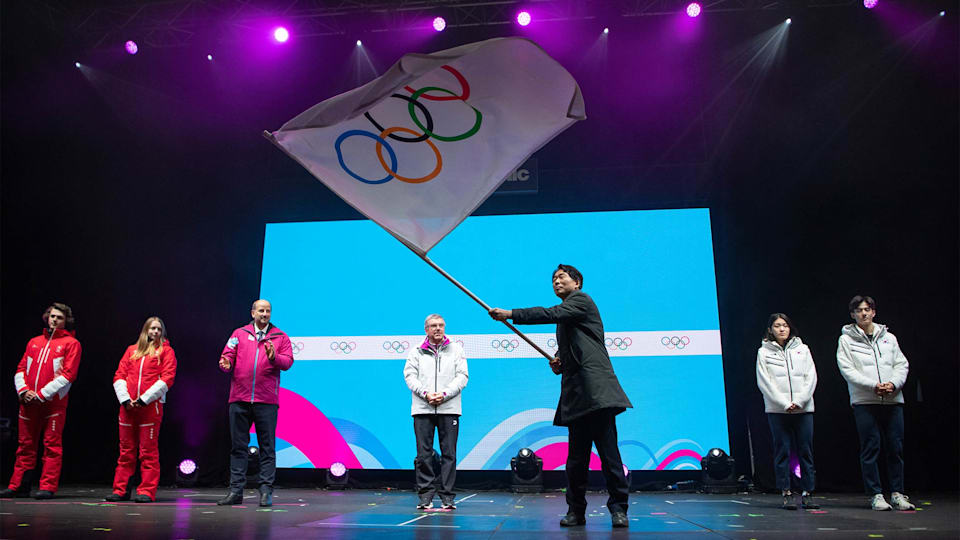From Lausanne to Gangwon: Winter Youth Olympic Games headed for Republic of Korea
The life of Choi Yeonu, a schoolgirl from Gangwon Province in the Republic of Korea, was changed by the PyeongChang 2018 Olympic Winter Games. “I sung with a choir at the event, and I was so inspired by the Olympic spirit,” she said.

“It made me want to follow my dreams and now I am studying to be a musical actor. I’d love to sing at the Gangwon 2024 Winter Youth Olympic Games with some students from North Korea. That would be a dream.”
Choi, 17, was part of the delegation that attended the 135th Session of the International Olympic Committee (IOC) at the Lausanne 2020 Winter Youth Olympic Games, at which it was announced that the Gangwon Province would be hosting the next edition.
From the beginning of the dialogue, the IOC has indicated that it would be ready to accept the Olympic Committee of the Democratic People’s Republic of Korea as a partner in the organisation of the fourth Winter Youth Olympic Games, if the circumstances allow.
“The leaders of the two Koreas have agreed to pursue joint participation in the Youth Olympics,” said Park Yang Woo, the Republic of Korea’s minister for culture sport and tourism. “The entire government of Korea will fully support the idea of having DPRK on board as co-hosts.
“The Olympic Games are all about peace and co-operation among participating counties and athletes. On the Korean peninsula, the relationship between our countries has gone through ups and downs. But as witnessed at 2018, sport can be a catalyst for creating peace.”
IOC President Thomas Bach highlighted several other benefits of Gangwon. “Consistent with the Olympic Agenda 2020 reforms, the proposed plans by Gangwon 2024 will ensure the Youth Olympic Games remain sustainable and affordable,” he said.
“The Gangwon 2024 proposition enhances the legacy of PyeongChang 2018. The interest shown by many regions around the world in hosting future Olympic and Youth Olympic Games demonstrates that our new approach, based on constant dialogue, flexibility, sustainability, legacy and creating a project together, is the right approach.”
The Gangwon bid was built heavily on the successes of PyeongChang 2018. It will use pre-existing venues used for those Games, including the four ice venues in Gangneung (for the skating events, curling and ice hockey), the sliding centre and the Phoenix Snow Park. The Youth Olympic Village will be located at student accommodation facilities at Gangneung-Wonju University.
“I think it means something good, because I can watch athletes there in Gangwon and cheer them on,” said You Young (KOR), the Lausanne 2020 women’s singles figure skating champion. “Gangwon is good place for Olympics because it's a good place for eating. Korean food is really good, and there’s a good rink over there.”
Seo Whi Min, gold medallist in the women’s 500m and 1000m short track speed skating, said: “I am proud we will be hosting the next Games. It will be a very good opportunity for our athletes to compete at a high level and also for many people to support the Games.”
Co-operation between the two Korean nations was central to the presentation. “Gangwon is exactly in the middle of the Korean peninsula, so it has been divided into two parts,” said Choi Moon Soon, the Governor of Gangwon.
“This separation made many people sad. That’s why PyeongChang 2018 was so special to us. Our province changed from land of conflict, to land of peace. 2024 will give us another chance.”
Choi was also proud to be the first Asian host of the Winter Youth Olympic Games. “It will continue PyeongChang’s legacy,” he said.
It is a sentiment that everyone at the Winter Youth Olympic Games will surely approve, as we say au revoir, Lausanne, and annyeong haseyo, Gangwon.
